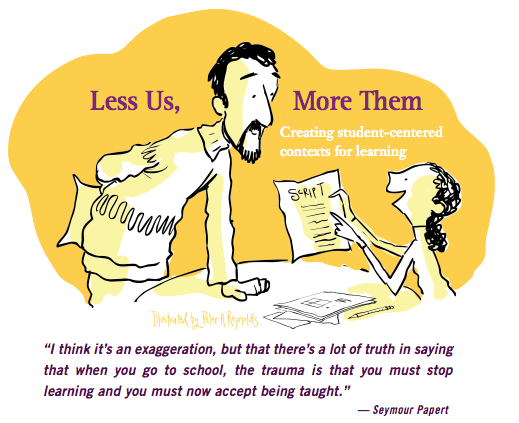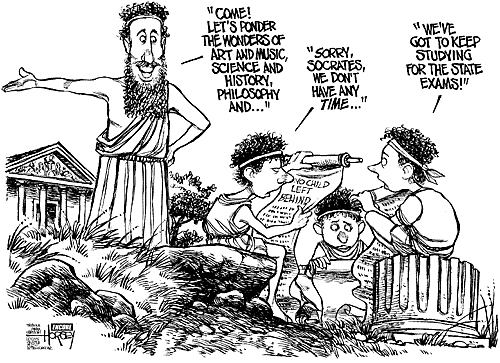Nov
2015
Digital Literacy for St. Cloud State University
Shortened URL: http://scsu.mn/1kLcn1o
Original URL: https://blog.stcloudstate.edu/ims/2015/11/11/powtoon-as-ppt-alternative/
what is Powtoon. http://www.powtoon.com/?edgetrackerid=1407528290497
PowToon is Web-based animation software that allows users to create animated presentations by manipulating pre-created objects, imported images, provided music and user created voice-overs.[4] Powtoon uses an Adobe Flex engine to generate an XML file that can be played in the Powtoon online viewer, exported to YouTube or downloaded as an MP4 file.[2]
https://en.wikipedia.org/wiki/PowToon
Why Powtoon.
Powtoon, like
Prezi (https://www.youtube.com/watch?v=as9po3WbOhI&list=PL09A34EF19596B7BB),
ThingLink (https://www.youtube.com/watch?v=aRkdIdbqHig)
Haiku Deck (https://www.youtube.com/watch?v=5crVTsJk9QE)
is one of the many cloud-based applications, which effectively can substitute PowerPoint. Here is an entry from this same blog, which list a generous choice of similar applications:
https://blog.stcloudstate.edu/ims/2015/08/27/presentation-tools-for-teaching/
Before you start working on PowToon, please consider the following guidelines for a good presentation design:
https://blog.stcloudstate.edu/ims/2015/10/13/presentation-design/
https://blog.stcloudstate.edu/ims/2015/09/19/presentation-design-rules/
Here are some tutorials, which you might consider:
Plamen Miltenoff, Ph.D., MLIS
Professor
320-308-3072
pmiltenoff@stcloudstate.edu
http://web.stcloudstate.edu/pmiltenoff/faculty/
http://www.cnn.com/2015/10/17/us/dot-drone-task-force/
and the objections against it: http://readwrite.com/2015/10/22/drones-regulations-laws-registry
Hope Reese | October 20, 2015, 1:04 PM PST http://www.techrepublic.com/article/faa-drops-the-hammer-on-drones-but-specifics-about-regulations-remain-up-in-the-air/
The specific FAA regulations are still unclear at this point—a task force is being assembled to collect recommendations by November 20th
Please have directions to the digital media studio
Adobe Connect Recording http://scsuconnect.stcloudstate.edu/p53yxcavsih/
online discussions with faculty from School of Education at St. Cloud State University, faculty and students from Plovdiv University and faculty from New Bulgarian University.
http://www.stcloudstate.edu/sped/faculty-staff.aspx
John Hoover: jhhoover@stcloudstate.edu – SCSU
Martin Lo: hlo@stcloudstate.edu – SCSU
Kyounghee Seo: kseo@stcloudstate.edu – SCSU
Galin Tzokov: g_tzokov@mail.bg, Gal.tzokov@gmail.com g – Plovdiv
zlaty.sh@gmail.comg – Plovdiv
Vladimira Angelova: vladiang@abv.bg – Plovdiv
Ludmil Duridanov : duridanov@gmail.com – NBU
Adobe Connect link: http://scsuconnect.stcloudstate.edu/ims/
Adobe Connect Recording from the December 10, 8AM (4PM local time in Bulgaria) with students and faculty from Plovdiv University and practitioners from K12 school in Plovdiv: http://scsuconnect.stcloudstate.edu/p20nzpx5g02/
online discussion with faculty, pre-service teachers and K12 teachers on the definitions and connection among these types of learning. Please share your questions and observations in the the comment section under the blog entry.
обучение в общности (community based learning), обучение базирано на проекти 9 project based learning ) и индивидуално обучение (personalized learning)
за краткото време от един час, ще се дискутираме дефинициите и връзката между три вида обучение, които са обект на внимание като част от реформата в американското обучение. Моля споделете мненията си и въпросите си в секцията за коментарии под блога
Constructivism: Lecture and project-based learning
http://www.swarthmore.edu/lang-center-civic-social-responsibility/community-based-learning-cbl
Community Based Learning (CBL) is a pedagogical approach that is based on the premise that the most profound learning often comes from experience that is supported by guidance, context-providing, foundational knowledge, and intellectual analysis.The opportunity for students to bring thoughtful knowledge and ideas based on personal observation and social interaction to a course’s themes and scholarly arguments brings depth to the learning experience for individuals and to the content of the course. The communities of which we are a part can benefit from the resources of our faculty and students, while the courses can be educationally transformative in powerful ways.
http://www.princeton.edu/cbli/
The Community-Based Learning Initiative (CBLI) connects students’ academic work with their interest in and concern for the communities around the University. Working with local nonprofits, students develop research projects, collect and analyze data, and share their results and conclusions, not just with their professors, but also with organizations and agencies that can make use of the information. Working with CBLI, students can do community-based research in courses, as a summer research internship, and as part of their junior paper or senior thesis.
Introduction to community based learning
http://academics.holycross.edu/files/cbl/Introduction_to_Community-Based_Learning.pdf
another form of experiential learning. Wide variation of definitions: off-campus academic learning or service learning. Field work, internships, community based research etc. connects classroom learning objectives with civic engagement.
https://en.wikipedia.org/wiki/Service-learning
Service-Learning must properly connect the traditional classroom experience with the real life lessons that come through service.
обучение базирано на проекти
Project-based learning is a dynamic classroom approach in which students actively explore real-world problems and challenges and acquire a deeper knowledge. http://www.edutopia.org/project-based-learning
https://www.pinterest.com/rxinsider/experiential-learning-service-learning-experientia/
https://www.youtube.com/watch?v=LMCZvGesRz8

http://www.learningreviews.com/Project-Based-Learning-Lesson-Plans.html
http://edglossary.org/personalized-learning/
http://www.personalizelearning.com/

обучение фокусирано около студента



Socratic method, also known as method of elenchus, elenctic method, or Socratic debate, is named after the classical Greek philosopher Socrates. It is a form of inquiry and discussion between individuals, based on asking and answering questions to stimulate critical thinking and to illuminate ideas.
https://en.wikipedia.org/wiki/Socratic_method

Gamification Mechanic Benefits Each gamification mechanic result in one or more benefits.
Gamification Personality Types
People are motivated to play games differently.
Explorers: Pride themselves in exploring all facets of a game or the context surrounding it.
Killers: Driven by player vs player competition. Always comparing themselves to others.
Socializer: Prefers to chat, play cooperatively, and share game experiences with others.
Achievers: Look to achieve all objectives available in a game. Desires to beat the game itself.
==========================
Adaptive learning systems provide each student with a personalized learning experience, adapting the presentation of the content, and possibly the assessment to the individual ability of the student
==============================================
=============================
=============================
slide 11: Two primary design goals supported through Data Visualization:
–What story is the data telling you
–Identify patterns and exceptions
–Compare, contrast, choose
–Explain, make a point, decide
slide 15:
qTo communicate
qPresent more clearly or more forcefully than would be accomplished with text or tables
qReports, dashboards, infographics, etc.
qTo discover
qAllow us to see what would be difficult or impossible to see if not presented in a useful visualization
qRealm of research but moving into the mainstream
qCan same visualization serve both purposes?
======================
========================
==============================
https://drive.google.com/file/d/0B4vcm8Bg5pkcWFlaQ1J3b3duc2M/view
5. Using small unmanned aerial vehicles today is similar to the “fair use” of media
http://www.dronesurvivalguide.org
Resources – Higher Ed Drone Policies
The Ohio State University
Iowa State University
Indiana University
University of Kansas
Penn State University
University of New Mexico
The Association of College and University Policy
Administrators (ACUPA, acupa.org)
===================
Sessoms, D. (2008). DIGITAL STORYTELLING: Training Pre-service Teachers to Use Digital Storytelling Across the Curriculum. In K. McFerrin, R. Weber, R. Carlsen & D. Willis (Eds.), Proceedings of Society for Information Technology & Teacher Education International Conference 2008 (pp. 958-960). Chesapeake, VA: Association for the Advancement of Computing in Education (AACE). http://www.editlib.org/p/27300/
Yuksel, P., Robin, B. & McNeil, S. (2011). Educational Uses of Digital Storytelling all around the World. In M. Koehler & P. Mishra (Eds.), Proceedings of Society for Information Technology & Teacher Education International Conference 2011 (pp. 1264-1271). Chesapeake, VA: Association for the Advancement of Computing in Education (AACE). http://www.editlib.org/p/36461/
http://www.freetech4teachers.com/2015/07/frequently-overlooked-useful-youtube.html
http://www.freetech4teachers.com/2015/10/how-to-create-word-cloud-in-google.html
Spring 2016 technology Sessions available |
|
|
Student’s relationship with technology is complex. They recognize its value but still need guidance when it comes to better using it for academics. |
Educause’s ECAR Study, 2013 |
InforMedia Services |
|
| IMS faculty would be happy to meet with you or your group at your convenience. Please request using this Google Form: http://scsu.mn/1OjBMf9 or by email: pmiltenoff@stcloudstate.edu | informedia@stcloudstate.edu |
|
How you can reach us:
Services we provide:
|
|
+++++++++++++++++++